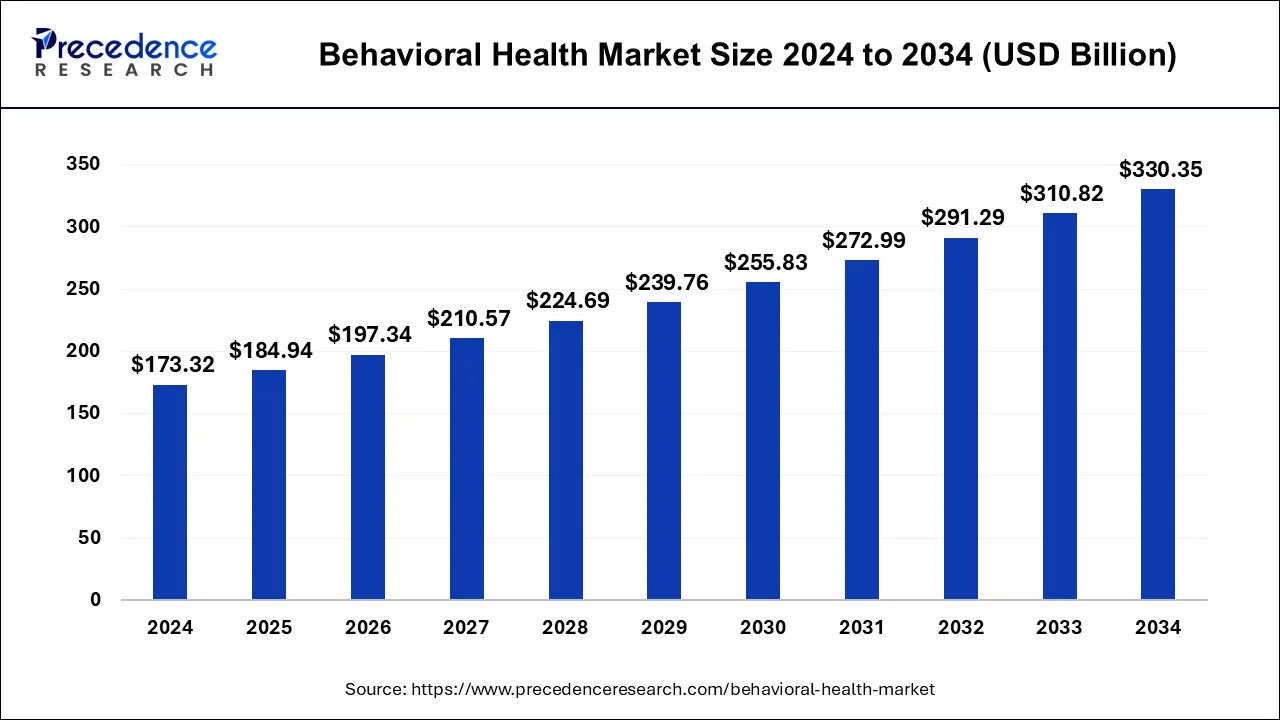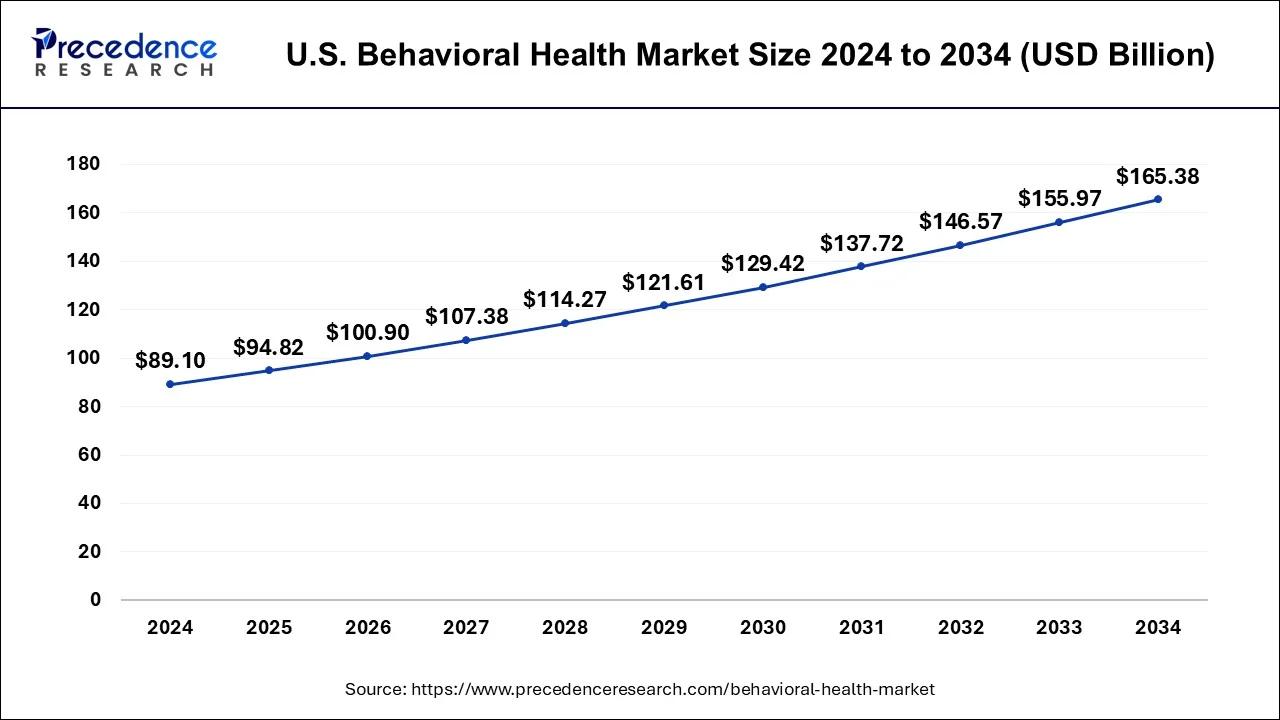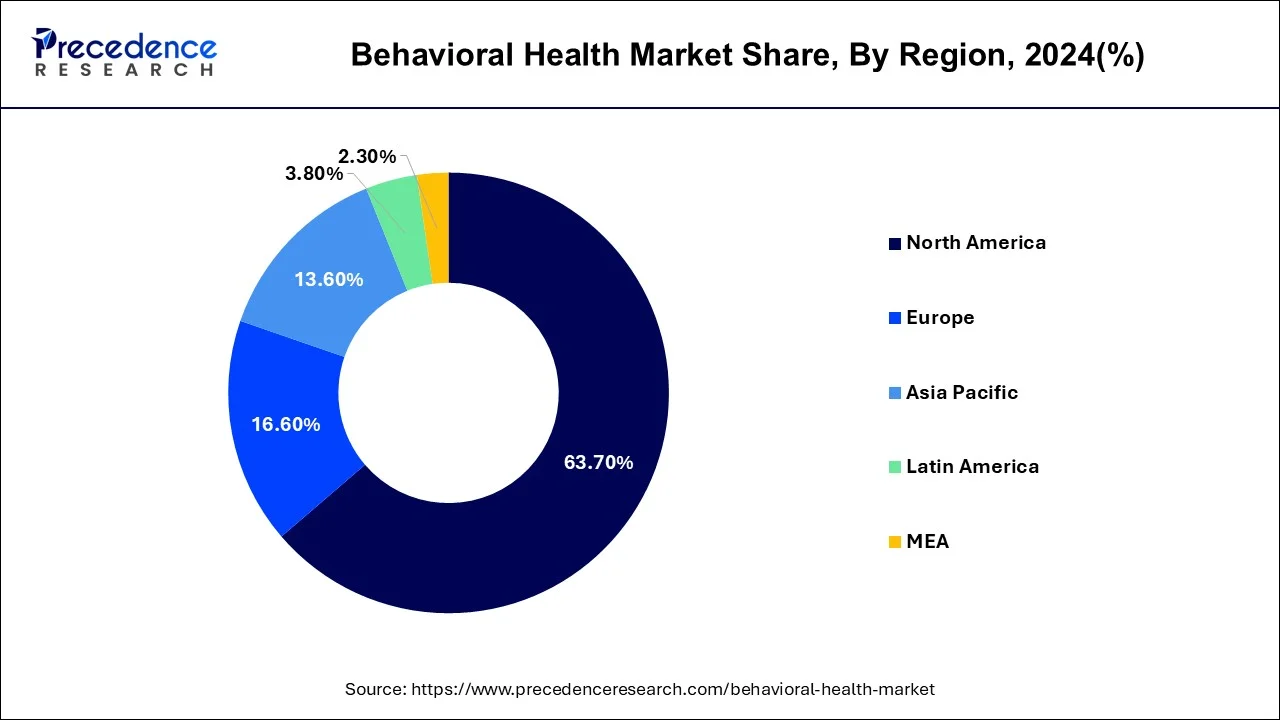What is the Behavioral Health Market Size?
The global behavioral health market size accounted for USD 184.94 billion in 2025 and is anticipated to reach around USD 330.35 billion by 2034, expanding at a CAGR of 6.70% from 2025 to 2034.

Market Highlights
- The North America dominated the global market with the largest market share of 63.7% in 2024.
- Europe generated a revenue share of over 16.6% in 2024.
- By Service Type, the inpatient services segment has held the largest revenue share in 2024.
- By Service Type, the depression & anxiety segment held the highest market share in 2024.
- By End-Users, the behavioral health segment dominated the global market in 2024.
Market Size and Forecast
- Market Size in 2025: USD 184.94 Billion
- Market Size in 2026: USD 197.34 Billion
- Forecasted Market Size by 2034: USD 330.35 Billion
- CAGR (2025-2034): 330.35%
- Largest Market in 2024: North America
- Fastest Growing Market: Europe
Behavioral Health Market Growth Factors
Human behavior is always being considered as one of the important indicators to judge the wellbeing of human society. Across the world, there is a continuous rising problems related to behavioral health disorders and it surge rapidly which leads to increasing the demand for behavioural health products. The major factor promoting the growth of the market is due to increasing self-awareness followed by increasing per-capita healthcare expenditures. Easy availability of expert in urban region is also the cause of growth in the segment. Furthermore, social acceptance in the society also promotes the individuals to come up and openly discuss the behavioural issue. Technological innovation like Cognitive Data collection and Artificial intelligence helps the physician to provide targeted therapy to the patients suffering from behavioural disorders.
Rising investment in technological advancement is the major clue for the treatment of behavioral health in the future. The rapid penetration of the various activity related application which helps in the collection of the behavioral issues of the patients. Mobile devices like smart phones, tablets, and others are constantly providing information to the doctors and researchers to increase the understanding of the mental well beings.
Despite a heavy surge in behavioral health, some of the major factor which restricts the growth the market includes the discontinuation of the treatment followed by a lack of trained professionals across the world. Lack of the penetration of the technologies in the various populated countries like India, China, and Indonesia is also considered one of the major factors which limits the growth of the market.
Mental health problems affects 1 in 5 individual across the globe. According to the World Health Organization, in 2020, over 264 million people suffered from depression which included people from all age groups. Depression is one of the major contributors to the global burden of diseases. The rising prevalence of depression and other mental illnesses, growing geriatric population, and increasing awareness regarding mental health among the population is prominently driving the growth of the global mental health market. According to the United Nations, the geriatric population across the globe is estimated to reach at 2 billion by 2050. Furthermore, rising depression cases is resulting in the growth in the number of suicides. Depression is a major cause of suicide. It is estimated that around 60% of individuals who commits suicide had a mood disorder. According to the World Health Organization, more than 700,000 people dies by committing suicide every year. Therefore, the growing incidences of depression and suicide are fueling the growth of the global behavioral health market.
The rising government initiatives and investments in deploying digital technologies in the healthcare sector to increase the quality of patient care services, improve operational efficiency, and reduce healthcare costs is expected to drive the growth of the behavioral health market. Furthermore, considerable growth in the number of mental health awareness programs conducted by various profit and non-profit organizations is contributing positively towards the market growth. The rising consumption of alcohol and rising prevalence of substance abuse is increasing the cases of mental health disorders across the globe. The increasing penetration of mental hospitals, rising investments on the development of healthcare infrastructure, and deployment of smart and digital technologies in the healthcare sector is estimated to drive the market growth during the forecast period. The availability of home-based services is expected to spur the demand for the mental health services at home, which is expected to be an important market driver in the forthcoming years.
MarketScope
| Report Highlights | Details |
| Market Size in 2025 | USD 184.94 Billion |
| Market Size in 2026 | USD 197.34 Billion |
| Market Size by 2034 | USD 330.35 Billion |
| Growth Rate from 2025 to 2034 | CAGR of 6.70% |
| Largest Market | North America |
| Base Year | 2025 |
| Forecast Period | 2025 to 2034 |
| Segments Covered | Service, Disorder, End-Users, and Region |
| Regional Scope | North America, APAC, Europe, Latin America, MEAN, Rest of the World |
Behavioral Health Market Dynamics
Drivers
Rising awareness about mental health issues
According to the World Health Organization nearly 14% of adults aged 60 and above have mental disorders. Behavioral health includes mental health, depression, anxiety, and eating disorders. The rising prevalence of serious mental illness among children, old-age, and adults along with awareness about mental health issues is driving the demand for behavioral health services. Moreover, there has been a growing societal awareness and acceptance of mental health issues, leading more individuals to seek treatment and support. People are now making efforts to reduce the stigma surrounding mental health and substance abuse which is further proliferating the market growth.
Growing digital health solutions
JMIR Publications article states that in January 2022, children and their families in Spain opted for tele-home care since it was 9% less expensive than standard hospital treatment, freeing up hospital beds for more serious conditions. There has been a recognizable growth in the field of telemedicine for providing health care services for mental illness. Telepsychiatry is a kind of modern technology, acting as a key contributor to the rise in the interaction between psychiatrists and patients. Numerous mental health care providers are offering this service to outpatient clinics, emergency departments, and military bases. Awareness of telepsychiatry to service providers has anticipated its driving conduction in other developed countries. These days, mental health software is being used by medical professionals to understand the pattern of problems and provide the required treatment.
Restraints
Lack of mental health professionals
According to the Association of Medical Colleges, there is a deficit of mental health professionals in federal government-designated regions, home to almost 150 million people. The lack of availability of trained professionals is one of the major factors hindering the growth of the behavioral health market. Lack of infrastructure and funding especially in backward or underdeveloped areas also deter the market growth. Furthermore, many mental health professionals are approaching retirement, which exacerbates the shortage issue. The need for succession planning and training the next generation of professionals is extremely crucial.
High cost of treatment
One of the core reasons that hamper the growth of the behavioral health market is the high cost of treatment. Mental health disorders are connected with high costs with the level of disease severity. Due to the treatment's influence on costs, the level of mental problems will also be considered in the future for cost of illness studies. Access to mental health services is still restricted by the high cost, despite the Affordable Care Act's requirement that medical insurers cover behavioral and mental healthcare.
Opportunity
Emergence of mental health care programs at the workplace
Mental illness has become a major issue, especially among adults and it is gaining acceptance across the globe. The number of people suffering from depression has experienced a significant increase. To take care of the employee's mental health, companies are taking various initiatives for the mental well-being of workers. According to the data published by WHO in September 2022, anxiety and depression lead to 12 billion missed working days annually worldwide, costing $1 trillion in lost productivity.
Segments Insights
Service Type Insights
The outpatient counseling segment is expected to dominate the market with the largest share in 2024. Outpatient counseling is rapidly expanding, particularly in emerging countries, as more individuals are increasingly seeking flexible and accessible mental health support. The flexibility offered by outpatient settings where patients can receive therapy or treatment without hospitalization. On the other hand, the telebehavioral / telepsychiatry services are anticipated to grow at the fastest CAGR, owing to the growing demand for mental health services, supportive government policies, and the rising need for convenience and cost-effectiveness of remote care. There is a growing prevalence of mental health disorders increases the demand for telepsychiatry services that provide psychiatric evaluations, therapy, counselling, and medication management.
Disorder Type Insights
The anxiety disorders segment held a dominant presence in the behavioral health market in 2024. The segment includes generalized anxiety disorder (GAD), panic disorder, social anxiety disorder, and specific phobias. The growth of the segment rising public awareness of mental health issues, rising stress levels among adults, such as academic and financial pressure. Moreover, the rapid advancements in technology have significantly expanded access to effective care through telehealth, mobile apps, and other digital therapeutics tools, bolstering the segment's growth. On the other hand, the substance use disorders segment is expected to grow at a notable rate. The segment includes alcohol use disorder, opioid use disorder, and drug abuse (cocaine, marijuana, prescription drugs, etc.) The segment's growth is mainly driven by the rising young population with SUDs such as alcohol, marijuana, and nicotine. The technological innovation, like tele-psychiatry and digital health tools that improve access to care, and the increasing expansion of integrated treatment models that address individuals with SUD disorders. Such factors are bolstering the segment's expansion.
End-UsersInsights
Depending on end-users the global behavioural health market is categorized into outpatient clinics, rehabilitation centers, hospitals (emergency), and homecare settings. The outpatient clinics is predicted to occupy the largest market share in the year 2024 and will uphold this trend within the forecast year. Rapid technological advancement and the penetration of the internet are considered the mark key for both self as well as for creating awareness across the world.
Setting of Care Insights
Including anxiety, stress, depression, and PTSD, leading to a higher demand for accessible and affordable care. The hospitals segment registered its dominance over the global behavioral health market in 2024. Hospitals are increasingly popular and serve as a key segment. Hospitals provide effective mental health care services, including emergency interventions and inpatient treatment. The increasing cases of anxiety disorders, substance abuse disorders, mood disorders, and post-traumatic stress disorder (PTSD) increase the need for psychiatric care and advanced mental health facilities, which are offered by hospitals. Significant increases in funding and investments are flowing into the behavioral health sector. Additionally, the rising adoption of digital health tools and behavioral health software in hospitals is expected to propel the segment's growth during the forecast period. On the other hand, the online platforms / virtual care are expected to witness remarkable growth during the forecast period, owing to the increasing awareness of mental health issues, surge in smartphone penetration, and the growing need for convenient as well as affordable access to mental health care. In recent years, online platforms have been increasingly gaining immense popularity, offering convenient consultations with licensed and spealist therapists from the comfort of home. The segments also include prominent telehealth platforms, mental health apps, and SaaS solutions that facilitate remote consultations.
Regional Insights
U.S. Behavioral Health Market Size and Growth 2025 to 2034
The U.S. behavioral health market size surpassed USD 94.82 billion in 2025 and is expected to be worth around USD 165.38 billion by 2034, poised to grow at a CAGR of 6.40% from 2025 to 2034.

Behavioral health becomes an important aspect of global studies. North America does the most quality studies related to behavioral health and its impact on society. United Statesalso proved to be quicker acceptance and implication of the technological advanced products. As per the WHO, it is found that costs for the treatment for the behavioral disorders prove to be much higher compared to the other major chronic condition. As per the study, it is also concluded that around 36% of the U.S. population suffering from some kind of mental disorder in their lifetime. A rising percentage of the geriatric population in Europe is also considered as a major concern that promotes the growth of mental disorders.
North America was the dominating behavioral health market in 2024. The increased prevalence of various mental health problems in US has resulted in the dominance of North America in the global mental health market. According to the National Center for Health Statistics, suicide rate has increased by around 35% from 1999 to 2018. Suicide is a result of depression & anxiety and suicide is the tenth-leading cause of death in the US. Moreover, the rising cases of substance abuse in US is also contributing exponentially towards the market growth. According to the Substance Abuse and Mental Health Services Administration (SAMHSA), every 1 in 4 individual in US has substance use disorder. According to the National Center for Drug Abuse Statistics, around 31.9 million people in US use illegal drugs and around 8.1 million of them have a drug use disorder. The presence of developed healthcare infrastructure in the region, increased awareness regarding mental health, improved access to mental health services, higher healthcare expenditure, and increasing geriatric population are some of the prominent factors that drives the growth of the North America behavioral health market.

Asia Pacific is estimated to be the fastest-growing market during the forecast period. Asia Pacific is witnessing rising cases of mental health disorders owing to the rising cases of physical health illnesses and disability and rising consumption of illicit drugs. The presence of huge youth population coupled with rising consumption of alcohol and substance abuse. The rising prevalence of depression is resulting in the rising number of suicide cases. According to the World Health Organization, around 77% of the global suicide incidences occur in low and middle income countries. Furthermore, the rising awareness regarding mental health and growing investments in the development of healthcare infrastructure in the region is expected to boost the behavioral health market growth in Asia Pacific. A large pool of population exists in Asia pacific, with rapid economical development followed by increasing per-capita healthcare expenditure considered as one of the major driving factors for the growth of the behavioral health market.
Behavioral Health Market Companies
- Acadia Healthcare Co.
- Universal Health Services, Inc.
- Magellan Health Inc.
- National Mentor Holdings Inc.
- Behavioural Health Services Inc.
- Behavioural Health Network Inc.
- North Range Behavioural Health
- Seton Healthcare Family (Ascension Health)
- Ocean Mental Health Services
- Beacon Health Strategies
- Others
Recent Developments
- In January 2025, Carisk Partners announced the launch of its enhanced Behavioral Health program. This new program underscores Carisk's commitment to advancing access to behavioral health services and addressing lower acuity conditions.
- In December 2024, Sukoon Health launched MERA Sukoon. This 24x7 mental health emergency service is designed to provide immediate assistance to individuals in distress and their families. This innovative service offers round-the-clock access by a dedicated team of mental health experts, ensuring timely and compassionate care during critical moments.
Segments Covered in the Report
By Disorder Type
- Anxiety Disorders
- Generalized Anxiety Disorder (GAD)
- Panic Disorder
- Social Anxiety Disorder
- Specific Phobias
- Mood Disorders
- Depression (Major Depressive Disorder)
- Bipolar Disorder
- Dysthymia
- Substance Use Disorders
- Alcohol Use Disorder
- Opioid Use Disorder
- Drug Abuse (Cocaine, Marijuana, Prescription Drugs, etc.)
- Attention-Deficit / Hyperactivity Disorder (ADHD)
- Schizophrenia and Other Psychotic Disorders
- Post-Traumatic Stress Disorder (PTSD)
- Eating Disorders
- Anorexia Nervosa
- Bulimia Nervosa
- Binge-Eating Disorder
- Obsessive-Compulsive and Related Disorders
- Sleep Disorders
- Others
- Personality Disorders
- Autism Spectrum Disorders (Behavioral Therapy)
By Service Type
- Inpatient Treatment Services
- Psychiatric Hospitals
- Residential Treatment Centers
- Outpatient Counseling Services
- Therapy & Counseling (Individual, Group, Family)
- Partial Hospitalization Programs (PHPs)
- Intensive Outpatient Programs (IOPs)
- Emergency Mental Health Services
- Crisis Stabilization
- Suicide Prevention Hotlines
- Home-Based Treatment Services
- Case Management & Support Services
- Social Work & Housing Support
- Employment & Vocational Services
- Telebehavioral / Telepsychiatry Services
By Setting of Care
- Hospitals
- General Hospitals with Behavioral Units
- Psychiatric Hospitals
- Outpatient Clinics
- Mental Health Clinics
- Community Mental Health Centers
- Residential Treatment Centers
- Homecare Settings
- Online Platforms / Virtual Care
By Region
- North America
- Europe
- Asia-Pacific
- South America
- Middle East & Africa
 Get a Sample
Get a Sample
 Table Of Content
Table Of Content